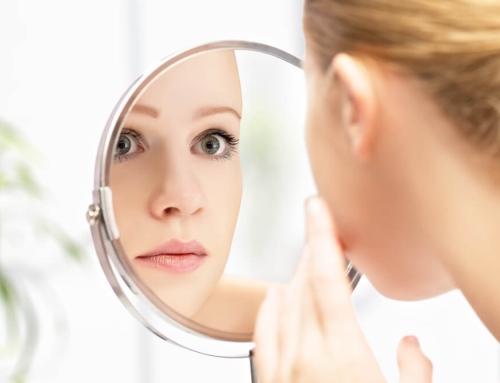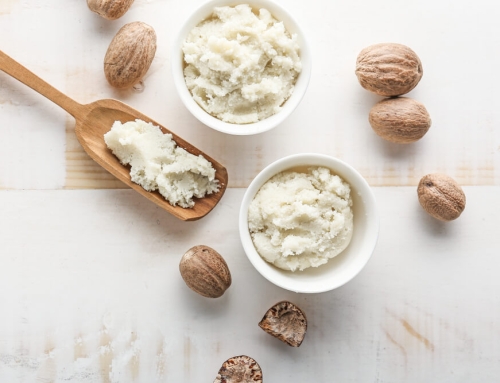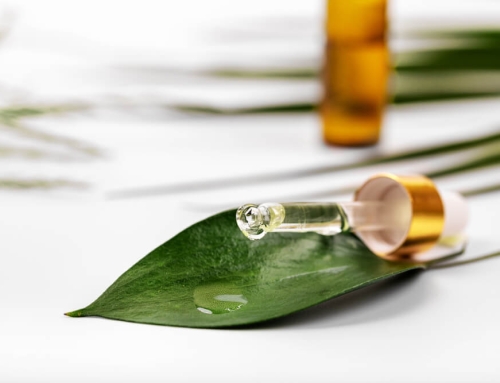When it comes to the appearance of your skin, collagen is key. It is one of the main structural proteins that gives your skin its firmness and smoothness – think of it like a scaffolding over which your skin sits.
Your skin produces plenty of collagen while it is young. This is why the skin of a baby is so beautifully smooth and plump. However, as you age, your skin produces less and less collagen, leading to fine lines, wrinkles and sagging skin.
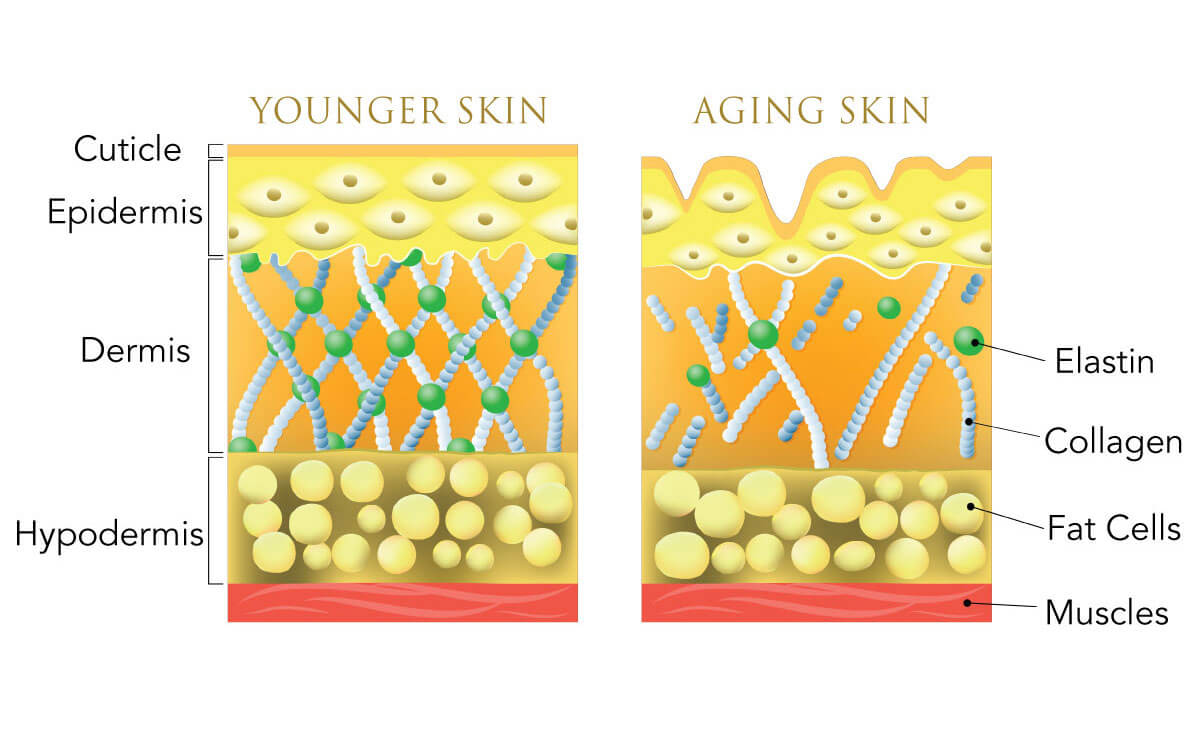
While there are plenty of skin care products out there designed to superficially treat wrinkles and aging skin, your best bet for long term improvement would be to stimulate your skin’s natural production of collagen, boosting this back up again.
How?
A healthy lifestyle is important, as is always keeping your skin protected from the sun, because UV rays are one of the biggest culprits when it comes to collagen degradation. However, there are also certain skin care ingredients out there that are capable of significantly increasing the skin’s natural production of collagen. While it may take you longer to notice the effects of these ingredients (it takes the skin around 90 days to build new collagen fibers), the changes that take place will be occurring on a deeper, cellular level, giving you results that stick around.
Peptides
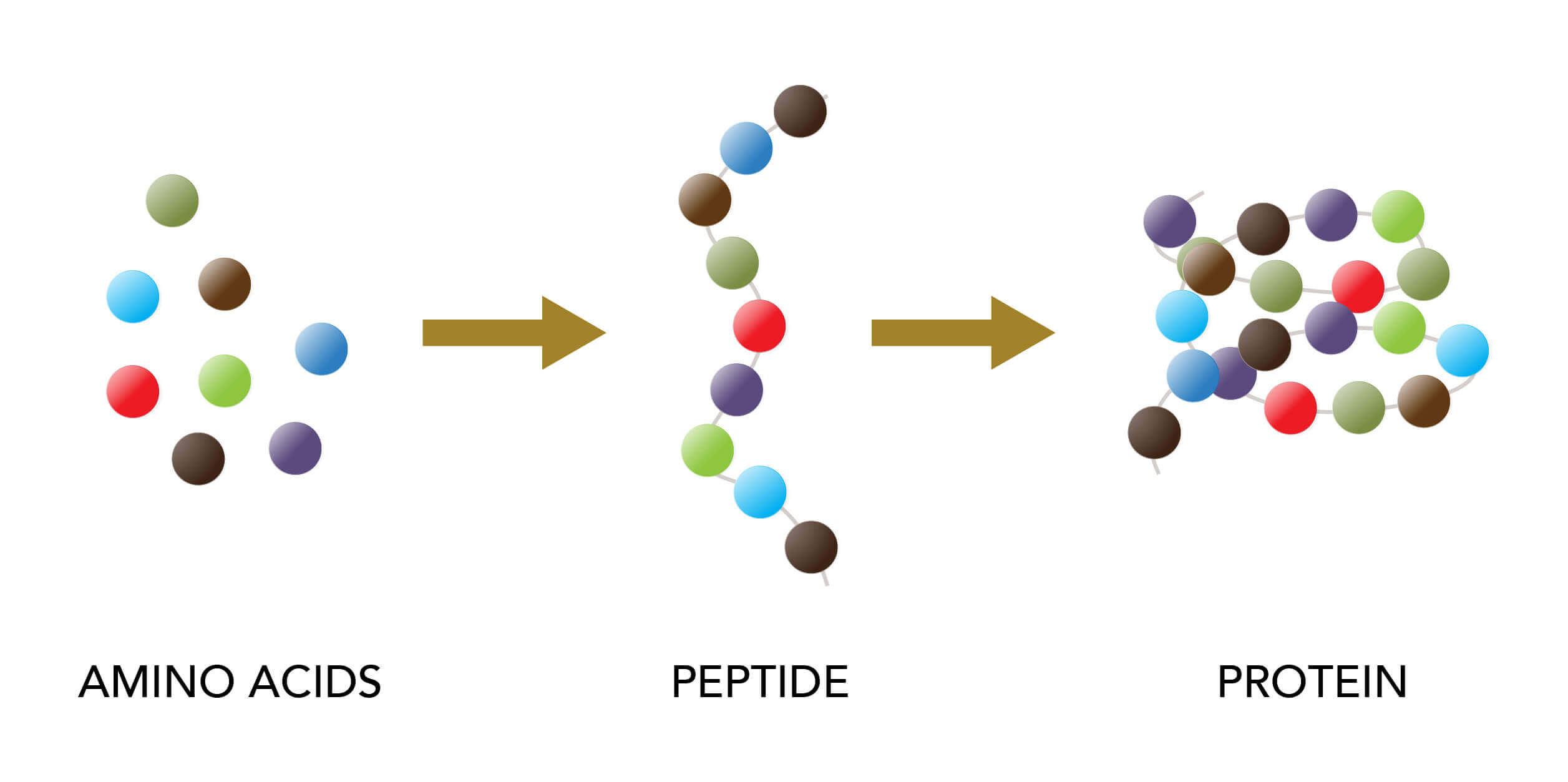
As mentioned above, collagen is a protein. So, in order to help your skin build more collagen, how about providing it with some of the very components that it uses when creating collagen?
This is where peptides come in…
Peptides are basically short chains of amino acids. When creating collagen, your skin joins specific peptides together, which is why providing it with extra peptides to use helps to speed up the collagen-building process.
Since peptides have a small molecular size, they are able to penetrate deep into the skin’s layers, making their way directly to the cells responsible for collagen production.
Now, just to make things a little more complicated…
There are several different peptides out there, and while they all help to stimulate collagen production in their own way, the peptides to look out for are signalling peptides. These work by sending signals to your collagen-producing skin cells, pretty much telling them to start building more collagen.
It can be difficult to find a product with the perfect peptide blend, but the OROGOLD 24K Termica Completion Cream meets all of the criteria. In addition to being formulated with three different peptides, this powerful moisturizer also contains some of the other ingredients on this list.
Amino Acids
So, if your skin needs peptides to build collagen, and peptides are made up of amino acids, then how about treating your skin to some extra amino acids too?
Amino acids are becoming an increasingly popular skin care ingredient. This isn’t only down to their collagen-building benefits, but is also due to the fact that amino acids play such a key role in the skin’s natural moisturizing factor. This is a protective coating that sits on the outside of the outermost layer of your skin, preventing your skin’s moisture from evaporating into the air.
Your natural moisturizing factor is so important when it comes to your skin’s hydration levels. In turn, adequate hydration helps to keep natural collagen production at a high, while also giving you a plumper and healthier complexion.
Just like with peptides, there are several different amino acids out there, but some of the most potent include:
- Proline
- Lysine
- Arginine
- Histidine (also has strong antioxidant properties)
Don’t yet own a skin care product that contains amino acids?
Give the OROGOLD 24K Multi-Vitamin Day Moisturizer + Amino Acid a try. It contains a blend of ten different amino acids, along with a few of the other collagen-building ingredients mentioned in this list.
Retinol
If you are already following an anti-aging skin care routine, then chances are that retinol is an ingredient you are well-familiar with. This skin care superstar is famous for being able to significantly reduce the appearance of fine lines and wrinkles, and this effect is all thanks to the way in which the vitamin A derivative increases natural collagen production.
Of course, retinol’s popularity is also due to its many other skin benefits, such as:
- Speeding up skin cell turnover
- Helping to keep pores unblocked, therefore reducing acne breakouts
- Fading scars and dark spots
- Evening out the skin tone and improving skin color
- Softening rough skin
One thing to keep in mind when adding retinol into your skin care routine…
This ingredient can be pretty harsh on the skin at first, with side effects for the first couple of weeks being common. Keep these to a minimum by introducing the ingredient to your skin gradually, beginning by using retinol just a couple of times a week before slowly increasing this.
Vitamin C
Vitamin C is another ingredient that many of you probably already use, with this vitamin regularly being touted as a skin care must-have. Just like the other ingredients on this list, vitamin C performs many different functions in the skin, one of which is aiding in the production of collagen.
Vitamin C works with the amino acids in your skin, namely proline and lysine, to build new collagen fibers. Numerous studies have pointed to the connection between vitamin C and collagen, with this vitamin being crucial in just about every stage of the collagen-building process.
If you decide to use vitamin C on your skin as a way to boost collagen production, some of the other benefits that you will experience include:
- Powerful antioxidant effects, with vitamin C being one of the most powerful free radical-fighters in the industry
- Skin brightening, with vitamin C able to effectively reduce the appearance of dark spots and hyperpigmentation. It can also prevent these from forming in the first place, so long as you are using the ingredient regularly and frequently
Pomegranate Extract
As a fruit, pomegranate is known for being loaded with a diverse array of nutrients, earning it the reputation of a superfood. The fruit contains more than 100 different phytochemicals, many of which are capable of truly transforming your complexion.
When it comes to collagen, studies have shown pomegranate extract to be highly effective at increasing the skin’s levels of collagen, therefore improving the appearance of aging skin.
However, that’s not all that pomegranate extract does…
This botanical brings with it several other anti-aging benefits, such as:
- Contains powerful antioxidants that help to slow down the skin aging process
- A great source of vitamin C, which is key when it comes to skin brightening and, as mentioned above, is also an important part of the collagen-building process
- Contains a polyphenol called ellagic acid, which provides the skin with a small amount of natural UV protection
- Increases skin cell regeneration
Ideally, for best results, you should be combining this fruit extract with a few other collagen-building ingredients. This is exactly what the OROGOLD 24K Nano Hydra Silk Mask was created for – in addition to several different fruit extracts, including pomegranate, this nourishing face mask also contains peptides, vitamin A and sodium hyaluronate.
Glycolic Acid
Glycolic acid is a popular chemical exfoliant, with many turning to this ingredient as a way to unclog their pores, clear away dead skin cells and give their skin a deep cleanse. This alpha hydroxy acid (AHA), which comes from sugar cane, has the lowest molecular weight when compared to other AHAs, enabling it to penetrate deeper into your skin. This is why the ingredient is so effective, and why it tends to be the top choice for those seeking a chemical exfoliant.
Now, in addition to those powerful exfoliating benefits, glycolic acid has also been shown to increase collagen synthesis in the skin. The way in which it increases the absorption of other ingredients is another added bonus, especially when you combine glycolic acid with other collagen-building ingredients.
Just like with retinol, your skin will find glycolic acid pretty strong to begin with. Make sure to start off slow, using the ingredient just once a week at first, before building this up if needed. If your skin is dry or sensitive, you may find that a low concentration of glycolic acid once a week is all that your skin requires.
Hyaluronic Acid
Hyaluronic acid is a substance that is naturally found in the body, but, just like with collagen, the amount of hyaluronic acid the body produces declines rapidly with age.
What does hyaluronic acid actually do?
It basically holds on to water, keeping your skin plump and hydrated while keeping your joints lubricated. In fact, hyaluronic acid is capable of holding up to 1000 times its weight in water, meaning that just a small additional amount of the ingredient can have a transformative effect on the skin.
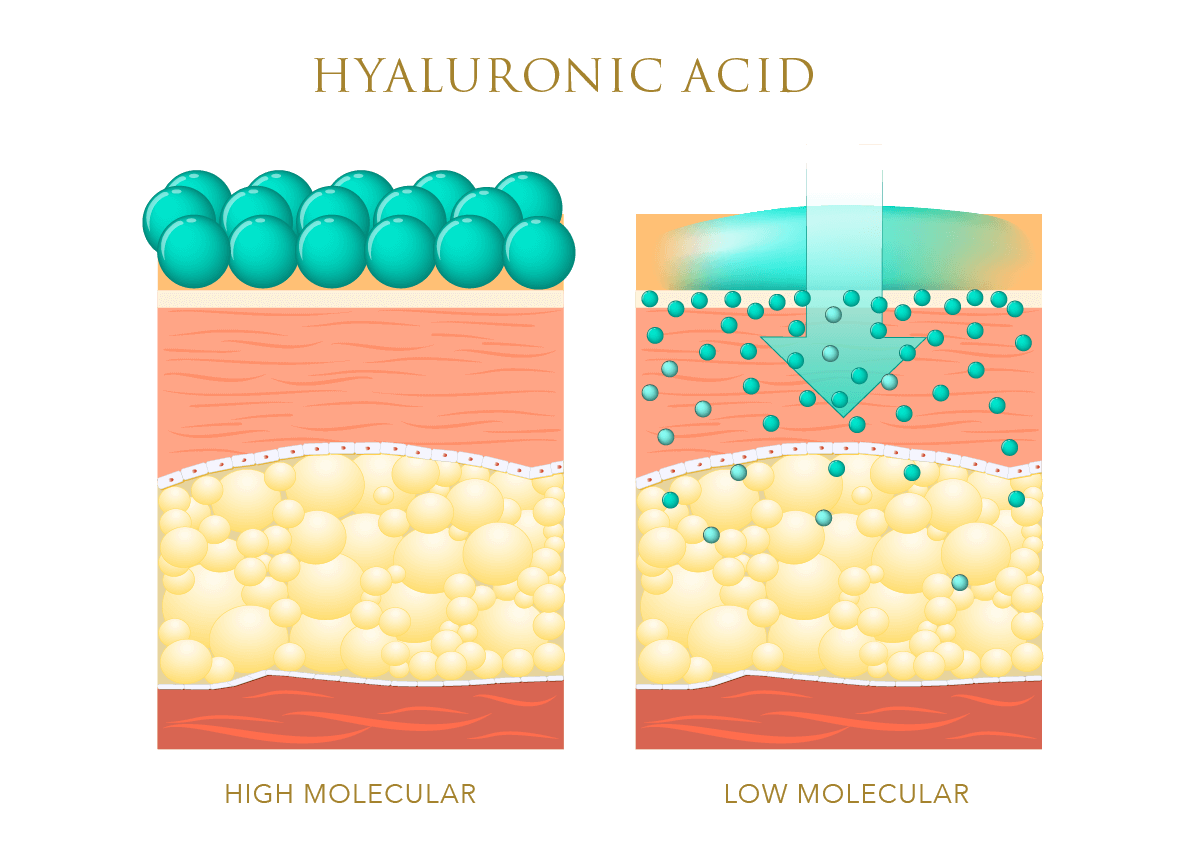
You’re probably thinking…
What does all of this have to do with collagen?
Research shows that hyaluronic acid is able to boost the skin’s production of collagen. Although only a handful of studies have focused on this so far, the hydrating and moisture-binding effects of the ingredient still make it well worth adding into your skin care routine.
Love the idea of hyaluronic acid?
If your skin would benefit from both these hydrating and collagen-building properties, try to incorporate both hyaluronic acid and sodium hyaluronate into your skin care routine. Sodium hyaluronate is a form of hyaluronic acid, but with a much smaller molecular size, enabling it to reach those deeper layers of your skin, where they can then have a more significant effect on your skin’s production of collagen.
Niacinamide
There are a few different forms of vitamin B3, with niacinamide being the most-studied, likely because it has always been viewed as being the most effective when used topically. It generally does not cause any side effects, even when used at quite potent concentrations, and brings with it a number of different anti-aging benefits.
One of these benefits is aiding in the skin’s natural production of collagen…
Many studies suggest that niacinamide is able to increase dermal collagen levels by quite a significant amount. One 12-week clinical study found that a topical solution containing 5% niacinamide was able to reduce fine lines by 21%, while improving skin tone and overall radiance by 14% and 15% respectively.
In addition to increasing the amount of collagen in the skin, niacinamide also helps to protect the collagen that is already there.
How?
By preventing glycation of the skin’s proteins.
Glycation is something that an increasing number of dermatologists are suddenly paying more attention to. To put it simply, glycation is a process that damages the protein fibers in the skin, including collagen. It is caused by the foods that you eat, namely sugars and carbohydrates, with the glucose from these attaching themselves to the proteins in your body, where they then cause their damage.
By preventing this process from occurring, niacinamide not only helps to preserve your existing collagen fibers, but also protects the other proteins in your skin too.
Not only does niacinamide help your skin build and preserve collagen, but this ingredient is also vital for the production of fatty acids and lipids, including ceramides. These compounds are required for optimal functioning of the skin barrier, which not only keeps the skin hydrated, but also protects it from environmental damage.
Your skin’s collagen is something that you want to protect and enhance as much as possible, especially if you’re looking to maintain your skin’s youthful luminosity. By adding a variety of collagen-building ingredients into your skin are routine, you will be giving your skin all that it needs to keep its production of collagen at a high, preventing that dreaded decline from taking place.


